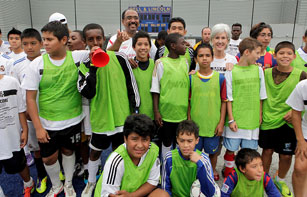
Feature Story
Putting young people at the centre of the response to HIV
10 August 2012
10 August 2012 10 August 2012
This year, in the lead up to International Youth Day, the United Nations is organising six live Google+ Hangouts, aimed at sharing information and good practices, and to provoke discussion on the role of the UN, Member States and Civil Society on how to better develop partnerships with young people. One of the hangouts focuses specifically on Sexual and Reproductive Health.
International Youth Day will be celebrated around the world this Sunday, August 12, reminding us of the crucial role that today’s young people play in the global response to AIDS. Young people between the ages of 15-24 are the group most affected by AIDS, accounting for 40% of all adult HIV infections. About 5 million are living with HIV worldwide, with over 2,400 15-to-24-year-olds infected every day in 2011. Although these numbers show a decrease in HIV prevalence among young people in the last decade, there clearly remains a lot of work to be done.
There have been many positive changes in sexual behaviour among young people, with a significant decrease in the number of young people having multiple partners or having sex before their 15th birthday, as well as increased condom use – but this is not true of all countries. According to the most recent population-based surveys in low- and middle-income countries, only 24% of young women and 36% of young men have an adequate knowledge of HIV prevention and transmission. This lack of education is a cause for concern, particularly in areas that have an enduring high prevalence of HIV.
All young people, particularly those living with HIV, should have access to youth-friendly services for reproductive health and HIV prevention and care, with appropriate services for young women, who represent 63% of all youth living with HIV. Education is essential: when young people are given the tools and incentives to adopt safe behaviours, they consistently demonstrate the capability to make responsible choices, and encourage others to do the same.
Several youth activists reiterated the importance of involving young people in decision-making roles in the fight against AIDS. They called on governments globally to abolish travel restrictions for PLHIV, decriminalize LGBTI populations and ensure universal access to health services for all populations.
Gabriel Munene, volunteer at the International AIDS Conference, Washington DC, July 2012
Experience shows that HIV programmes that affect young people are more effective when youth are engaged as partners and can participate in their design and implementation. The 2011 Political Declaration on HIV/AIDS called on all countries to support the active involvement and leadership of young people in the global, regional and national responses. Although 150 countries have already reported the inclusion of young people in their national AIDS strategic plans, only 91 of them have allocated budgets for youth programmes and activities. By involving young people in the decision-making process, we are empowering the people who are more aware than anyone of what needs to be done.
This year’s International AIDS Conference, held in Washington at the end of July, saw a number of events focusing on young people’s involvement in the AIDS response, including a Pre-Conference organized by YouthForce, a Youth Pavilion, and the launch of Youth Score with UNAIDS Executive Director Michel Sidibé.
Young people had the opportunity to voice their concerns regarding their role in the epidemic and what has to be done. Gabriel Munene was one of the many young people volunteering at the conference: “The Youth Pavilion was buzzing with activity throughout the conference and there was a high participation of young people from all around the globe. Several youth activists reiterated the importance of involving young people in decision-making roles in the fight against AIDS. They called on governments globally to abolish travel restrictions for PLHIV, decriminalize LGBTI populations and ensure universal access to health services for all populations.”

This year’s International AIDS Conference, held in Washington DC at the end of July, saw a number of events focusing on young people’s involvement in the AIDS response, including Youth Score, which attracted more than 200 young people who came out to participate in workshops and clinics with Lorrie Fair of the U.S. Women’s National Soccer Team; Steve Zakuani of the Seattle Sounders FC; and Michael Adams, former NBA player. Credit: UNAIDS/Y.Gripas
UNAIDS recognises the importance of working with young people in order to achieve an AIDS-free generation, and has introduced a number of programmes aimed at empowering young people and involving them in the development of plans that affect them. CrowdOutAIDS was launched in October 2011 as a collaborative policy that enabled young people to define a set of recommendations on how the UNAIDS Secretariat can work more effectively to engage young people in the HIV response, an initiative which saw the participation of over 5,000 young activists from 79 countries. Last month in Washington, CrowdOutAIDS partnered with YouthForce to launch A Declaration for Change: How Young People will achieve an AIDS-free generation, encouraging young people to collaborate, through social media, on a list of priorities which will lay the foundation for how youth organizations, networks and activists will work together to reach the 2015 goals of the Political Declaration.
This year, in the lead up to International Youth Day, the United Nations is organising six live Google+ Hangouts, aimed at sharing information and good practices, and to provoke discussion on the role of the UN, Member States and Civil Society on how to better develop partnerships with young people. One of the hangouts focuses specifically on Sexual and Reproductive Health.
Young men and women, who represent one fifth of the world’s population, are the key to achieving the UNAIDS vision of zero new HIV infections, zero discrimination, and zero AIDS-related deaths.
Related
 “Who will protect our young people?”
“Who will protect our young people?”

02 June 2025


